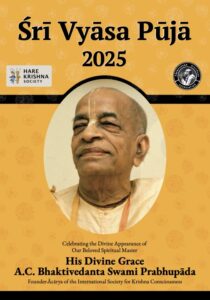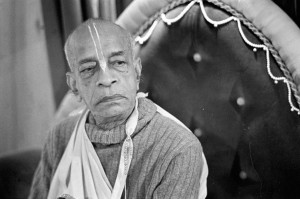SB 5.1.12 purport…The word manīṣayā (“by intelligence”) is of special significance. Priyavrata might argue that Lord Brahmā was requesting him to accept family life and the responsibility for ruling a kingdom, although Nārada Muni had advised him not to enter household life and be entangled in material affairs. Whom to accept would be a puzzle for Priyavrata because both Lord Brahmā and Nārada Muni are authorities. Under the circumstances, the use of the word manīṣayā is very appropriate, for it indicates that since both Nārada Muni and Lord Brahmā are authorized to give instruction, Priyavrata should neglect neither of them but should use his intelligence to follow the advice of both. To solve such dilemmas, Śrīla Rūpa Gosvāmī has given a very clear conception of intelligence. He says: anāsaktasya viṣayān yathārham upayuñjataḥ nirbandhaḥ kṛṣṇa-sambandhe yuktaṁ vairāgyam ucyate
Viṣayān, material affairs, should be accepted without attachment. and everything should be dovetailed with the service of the Lord. That is real intelligence (manīṣā). Becoming a family man or king in the material world is not harmful if one accepts everything for Kṛṣṇa’s service. That necessitates clear intelligence. Māyāvādī philosophers say, brahma satyaṁ jagan mithyā: this material world is false, and only the Absolute Truth is real. However, an intelligent devotee in the line of Lord Brahmā and the great sage Nārada—or, in other words, in the Brahma-sampradāya—does not consider this world false. That which is created by the Supreme Personality of Godhead cannot be false, but using it for enjoyment is. Everything is meant to be enjoyed by the Supreme Personality of Godhead, as confirmed in Bhagavad-gītā (5.29). Bhoktāraṁ yajña-tapasāṁ sarva-loka-maheśvaram: the Supreme Personality of Godhead is the supreme proprietor and enjoyer, and therefore everything should be dovetailed for His enjoyment and service. Regardless of one’s circumstances, favorable or unfavorable, one should use everything to serve the Supreme Lord. That is the perfect way to use one’s intelligence.
SB 5.1.16-Even if one is liberated, he nevertheless accepts the body he has received according to his past karma. Without misconceptions, however, he regards his enjoyment and suffering due to that karma the way an awakened person regards a dream he had while sleeping. He thus remains steadfast and never works to achieve another material body under the influence of the three modes of material nature.
PURPORT-The difference between a liberated and conditioned soul is that the conditioned soul is under the concept of bodily life, whereas a liberated person knows that he is not the body but a spirit, different from the body. Priyavrata might have thought that although a conditioned soul is forced to act according to the laws of nature, why should he, who was far advanced in spiritual understanding, accept the same kind of bondage and impediments to spiritual advancement? To answer this doubt, Lord Brahmā informed him that even those who are liberated do not resent accepting, in the present body, the results of their past activities. While sleeping, one dreams many unreal things, but when he awakens he disregards them and makes progress in factual life. Similarly, a liberated person—one who has completely understood that he is not the body but a spirit soul—disregards past activities performed in ignorance and performs his present activities in such a way that they produce no reactions. This is described in Bhagavad-gītā (3.9). Yajñārthāt karmaṇo ’nyatra loko ’yaṁ karma-bandhanaḥ: if one performs activities for the satisfaction of the Supreme Personality, the yajña-puruṣa, his work does not produce reactions, whereas karmīs, who act for themselves, are bound by the reactions of their work. A liberated person, therefore, does not think about whatever he has ignorantly done in the past; instead, he acts in such a way that he will not produce another body by fruitive activities. As clearly mentioned in Bhagavad-gītā:
mām ca yo ’vyabhicāreṇa bhakti-yogena sevate sa guṇān samatītyaitān brahma-bhūyāya kalpate
“One who engages in full devotional service, who does not fall down in any circumstance, at once transcends the modes of material nature and thus comes to the level of Brahman.” (Bg. 14.26) Regardless of what we have done in our past lives, if we engage ourselves in unalloyed devotional service to the Lord in this life, we will always be situated in the brahma-bhūta (liberated) state, free from reactions, and will not be obliged to accept another material body. Tyaktvā dehaṁ punar janma naiti mām eti so ’rjuna (Bg. 4.9). After giving up the body, one who has acted in that way does not accept another material body, but instead goes back home, back to Godhead.
Some Conclusions-These are very interesting verses and purports. Priyavrata was given two opposing instructions by Lord Brahma and Narada muni. He was told to enter family life and rule the universe which means entanglement, and he was also told by Narada to remain a bramacari and dont become entangled. To resolve these differences Prabhupada give us the answer by quoting Rupa Goswami-use everything we have in the service of God, or Krsna and in that way we wont become entangled. And , he adds, this requires great or clear intelligence.
Another interesting point is that we are shown the mentality of a liberated soul. He regards his sufferings or enjoyments just like an awakened man does his past dream from last night. When you awake, you know what you dreamed was just that-a dream, so why bother with it or place any importance upon it? Similarly, what we perceive in this present body, due to our past good or bad karma, is just like what we perceived in last nights dream state. It is real, but temporary, so we being eternal should not place much importance upon these temporary conditions. Deal with them, but do not become attached to them.
Hare Krsna
damaghosa das
——————————–
May 6 1973 LA lecture...So that is our Kṛṣṇa consciousness movement. We are trying to dovetail everything in connection with Kṛṣṇa. Make Kṛṣṇa center, and all your activities will be spiritual. That is distinction. Sa guṇān samatītyaitān brahma-bhūyāya kalpate [Bg. 14.26]. As soon as anything is done for Kṛṣṇa, the bhakti… So the beginning you cannot do so, that anything you can dovetail. No. In the beginning you have to learn first of all how to become Kṛṣṇa conscious. You are, we are in the training period. We are in the training period. We should not imitate: “Oh, Yudhiṣṭhira Mahārāja was ordered to speak lies, so let us go on speaking all lies.” No, not that. You cannot do so. First of all, be trained up. For being trained up, you have to follow the regulative principles, the orders of spiritual master. In this way, sevonmukhe hi jihvādau [Brs. 1.2.234]. When your all partsof your limbs will be engaged in Kṛṣṇa’s service, hṛṣīkeṇa hṛṣīkeśa-sevanam [Cc. Madhya 19.170], in this way when you are actually advanced, then whatever you do in Kṛṣṇa consciousness, that is good.
Thank you very much. (end)


